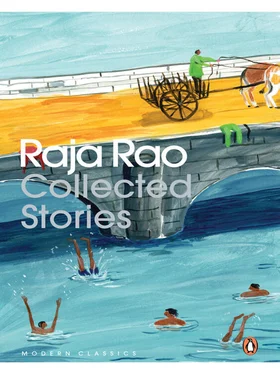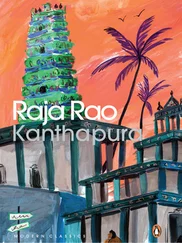Raja Rao - Collected Stories
Здесь есть возможность читать онлайн «Raja Rao - Collected Stories» весь текст электронной книги совершенно бесплатно (целиком полную версию без сокращений). В некоторых случаях можно слушать аудио, скачать через торрент в формате fb2 и присутствует краткое содержание. Год выпуска: 2014, Издательство: Penguin, Жанр: Классическая проза, на английском языке. Описание произведения, (предисловие) а так же отзывы посетителей доступны на портале библиотеки ЛибКат.
- Название:Collected Stories
- Автор:
- Издательство:Penguin
- Жанр:
- Год:2014
- ISBN:нет данных
- Рейтинг книги:5 / 5. Голосов: 1
-
Избранное:Добавить в избранное
- Отзывы:
-
Ваша оценка:
- 100
- 1
- 2
- 3
- 4
- 5
Collected Stories: краткое содержание, описание и аннотация
Предлагаем к чтению аннотацию, описание, краткое содержание или предисловие (зависит от того, что написал сам автор книги «Collected Stories»). Если вы не нашли необходимую информацию о книге — напишите в комментариях, мы постараемся отыскать её.
Collected Stories — читать онлайн бесплатно полную книгу (весь текст) целиком
Ниже представлен текст книги, разбитый по страницам. Система сохранения места последней прочитанной страницы, позволяет с удобством читать онлайн бесплатно книгу «Collected Stories», без необходимости каждый раз заново искать на чём Вы остановились. Поставьте закладку, и сможете в любой момент перейти на страницу, на которой закончили чтение.
Интервал:
Закладка:
Deliberately and silently the Sadhu and Shiv had torn all the notes except a few hundred-rupee ones. Someone fell upon them from the back and yet another, and another again. In the scuffle a young man was wounded, and many howled. And by the time the police had come the trunk had disappeared. But on that well-lit auspicious night Shiv and the Sadhu sat by Mother Ganga and threw each bit of paper one after the other into her waters. And the papers hissed as they entered the water, thus did Shiv celebrate his divali.
Few days later, Nanna came after her fasts. She was given the mantra. Shiv never goes to Gowalia Street any more. But he’s always so happy to see Nanna when she comes. Nanna is like a great big rock. Its beauty is that it is so firm. The more you look at it more you wonder at God’s patience in creation.
X
Ranchoddoss Sunderdoss was a jeweller in Bombay. You can still see on Girgaum Road the yellow-painted shop-sign, discoloured, hung high, the shafts and wheels of a dilapidated brougham lying all about under the young pipal tree in the front yard, and a little shrine, juts out of the garden walls, for the passers-by to worship at the idol of Panduranga Vithala that Rukmabai a devotee had seen arise before her just there, and in almost transparent marble, with flute, chest-jewel and white cow — and this must have occurred at least two or three hundred years ago. Even now on every full-moon night women come to worship the deity, for it’s he that gave a baby boy to Rukmabai, so legends say, to this simple woman who could not go to Pandharpur on pilgrimage (her husband was too unbelieving and pice-miserly to let her go) — thus the little children’s clothes that hang all about the door — for God alone gives, who else would give, tell me? And many a lady in Bombay even now has a child only because of this Panduranga of the Girgaum Road.
Thus it was, the Sunderdoss family finally decided, and during the good Queen Victoria days, to build a small temple around the idol of Panduranga and organized regular kirtans in ashad — to be precise, on the rounded full-moon day of the month, to commemorate the vision the Lord gave to Rukmabai, this humble devotee. On that day the Sunderdoss family, for generations, have worn heirloom gold (sometimes even new-fashion jewellery), that the god not forget the merchants that do ‘give and take’ business behind his temple. And so good is our Panduranga, he never forgets his neighbourly worshippers, nor does he forget the owner of Krishnabai, the cow which is fed by the passer-by with a handful of green grass and for an anna. Since the marble cow would not eat the grass, this cow will in the name of the Lord, and many an office-goer husband returning from his toils would beat his cheeks before the deity, and offer the cow her anna worth of graze. And at festival times of course, you had more worshippers, and the grass-cutters had a gay time. They too prayed for a son, and some had more than a son given by Panduranga Vithala. Of what worth a woman’s womb that does not bear a toddling heir? And some middle-class women in gratitude even bought two headgears for the child, and hung one at the sanctuary, while the other was taken home for the coming baby. And every baby who wore this grew to be intelligent and wise, and often won the first prize at the Anglo-Marathi High School, off the Gowalia Tank. Sometimes, a kind father coming back from his office remembers his baby’s first birthday would be the next Friday or Tuesday, and he just enters the Sunderdoss shop (under the new signboard, encrusted with silver and in Marathi, Gujarati and English characters, right over the door: Sunderdoss & Sons, High Class Jewellers. Shop Founded in 1799) to buy something for this coming celebration. And one of Sunderdoss’ brothers, Bhagavandoss, the elder, Ramadoss the younger, or Ranchoddoss the in-between (all clad in muslin dhotis, their little caps still in velvet and filigree), would take you in, and seating you on the pillowed seats, show you every type of silver waistband — those with a serpent’s hood, those with the lionman’s head, or those with just in-turning screws. You could now buy the little silver tumblers or milk-feeders for the baby, also in silver, and in addition, a ruby nose-ring for your wife if you were so tempted. And around the first of the month the Sunderdosses took in one of their cousins, Madandoss, to help them — such the crowd.
Ranchoddoss was not really very different from any other member of the family. He was hard-working, devoutly honest (a lie on earth costs a kingdom in Vaikuntha — heaven, his mother used to say) and was a genteel husband. He had two elderly sons, one nineteen and the other fourteen, and a daughter called Sudha. The boys were good at school, and so was the girl, though she went to Saint Mary’s Convent School, off Peddar Road. The bus took her to school and brought her safely back. Sudha was always the pet of Ramaben, her mother, and, ‘Sudha do this,’ and ‘Sudha do that’ ran like a thread amidst the noises of the household, for all the brothers lived together, and their children as well, but Sudha was the most loved of all. She was also the youngest. They say on the day she was born suddenly a peacock, wings outstretched and keening, strutted past the courtyard (the mother had gone to Kathiawar, to her own mother, for the childbirth) and everybody said: ‘Well, this girl, she will bring in holy riches.’ However no gold-lotuses rose in the backyard fountain on Girgaum Road, but money came in more and more — the Maharaja of Bhavnagar sent his own Dewan for the nephew’s marriage, and since the purchases went over a lakh of rupees (and those were the true old days when the rupee was still worth its weight in solid silver) and the honesty of Ranchoddoss impressed the Dewan so greatly, the Rajas of Gwalior and Indore came along, and even that American wife of the old Indore Maharaja. Sudha brought prosperity no doubt, but Sudha who was so full of song and fun, suddenly grew serious, as the women’s things on her chest arose, and she would hide her face behind pillars, even when her uncles and cousins passed by, or on her bed lie covered up with a light white sheet, all day. She hated talk, and she began to go less and less to school — but who cares? — a girl is meant for marriage as a wheel is destined for the cart. You don’t use a wheel for a ladder or for hanging your clothes on, do you? The wheel is meant for a chariot, a bullock cart, or even for a brougham, like those wheels rotting at the housedoor as there is no spring or axle to wheel the box. And all that European talk of women going to become politicians or professors is so much like making the river run backwards back. Of course you can make the river run backwards through canals, etc. But when the floods come, the dam and the sluices and the canals are washed away as so many cold weather leaves — so too the woman.
Yes, Sudha was very much a girl — a woman, in fact, for she was fourteen years of age, and she hated marriage. For her marriage (and all the girls at St Mary’s Convent School, only talked of boys and marriages) was something stupid, no, more than stupid — sinful. ‘Why touch a man?’ was her problem. Men seemed to her (all except her father, her uncles, her brothers) either awkward or evil. One never understood from where she got this idea — some said later it’s the way the Christian girls talked of boys, or it’s after she started going to films, and it’s the European films that did it. Sudha, however, sat for hours on end in the family sanctuary, repeating the Name of the Lord. ‘Rama, Sri Rama,’ she said and went on naming His Name a thousand times, and little by little three thousand times, a day. She even started on fasts and days of silence, and sometimes took a vow to name the Name-of-Rama a lakh of times in ten days. She grew pale but beautiful. The family did not worry — she was after all only fifteen.
Читать дальшеИнтервал:
Закладка:
Похожие книги на «Collected Stories»
Представляем Вашему вниманию похожие книги на «Collected Stories» списком для выбора. Мы отобрали схожую по названию и смыслу литературу в надежде предоставить читателям больше вариантов отыскать новые, интересные, ещё непрочитанные произведения.
Обсуждение, отзывы о книге «Collected Stories» и просто собственные мнения читателей. Оставьте ваши комментарии, напишите, что Вы думаете о произведении, его смысле или главных героях. Укажите что конкретно понравилось, а что нет, и почему Вы так считаете.












